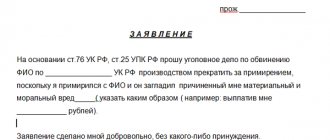Any conflict can be resolved peacefully, even if it involves a criminal offense. According to the Code of Criminal Procedure of the Russian Federation, there are several ways to terminate a criminal case without bringing the defendant to justice.
One of the most common methods is reconciliation. Reconciliation of the parties in criminal proceedings solves the problem of criminal prosecution of those persons whose behavior no longer poses a danger to society, and the subject of the dispute and conflict is resolved jointly with the injured party.
If the victim has no claims against the defendant, and the criminal incident is completely resolved, the criminal case can be terminated after reconciliation of the parties.
Features of reconciliation of parties in a criminal case
Art. 25 of the Code of Criminal Procedure of the Russian Federation regulates the termination of a criminal case in connection with the reconciliation of the parties. Not every crime can be closed on this basis.
For successful reconciliation, several conditions must be met:
- The criminal offense must be committed for the first time;
- The crime is of mild or moderate severity;
- The victim agrees to the termination of the case;
- The defendant fully made amends or compensated for the damage.
A first-time crime means that the defendant’s previous convictions have been completely expunged at the time of the trial in this case.
What does it mean to reconcile the parties in court? Reconciliation means closure of the criminal case, release of the defendant from liability and mutual resolution of the conflict.
Compensation for damage or amends can be made not only by the defendant himself, but also by other persons at his request.
No promises to make amends in the future will be taken into account by the court or investigation. Compensation for harm must be real, not potential.
At what stage is reconciliation possible?
Legislatively, reconciliation of the parties as a basis for termination of a criminal case is possible at any stage of criminal proceedings.
Pre-trial reconciliation of the parties is carried out by investigative or inquiry authorities on the basis of submitted statements of intention to reconcile on both sides. Judicial reconciliation of the parties in a criminal case is carried out on the basis of the same statements, but already addressed to the judge hearing the case.
As a rule, in practice in 2021, even if the parties wrote a statement to the investigator and expressed their intention to reconcile as part of investigative actions, the court will still terminate the case.
Arriving at the first court hearing, the defendant and the victim will have to again document their intention.
After the judge pronounces the verdict, there will be no opportunity for the parties to reconcile.
Does reconciliation presuppose a criminal record?
Whether the reconciliation of the parties in a criminal case is considered a criminal record is an incorrectly formulated question. In fact, when the parties reconcile, the criminal case is terminated.
This means that the defendant does not change his status to convicted. Based on this, there is no criminal record in this case.
However, information that a specific subject was prosecuted under this article will remain. This information is contained in the Information Centers of the Ministry of Internal Affairs. Upon request from police or court officials, this information will be provided by these centers.
Information from the Information Centers indicates that the criminal case was terminated on the basis of the article of the Criminal Procedure Code of the Russian Federation on reconciliation of the parties.
Crimes with reconciliation
Under what articles of the Criminal Code of the Russian Federation is it possible to reconcile the parties?
All criminal offenses are divided into crimes of private prosecution, public prosecution and private-public prosecution.
Regarding public crimes, the Code of Criminal Procedure of the Russian Federation only states that in order to reconcile the parties, it is necessary that the committed act be classified as of minor or moderate gravity. In this case, the crime must be committed for the first time.
For crimes of private prosecution, a special article 20 of the Code of Criminal Procedure of the Russian Federation is reserved . It says that cases of reconciliation of the parties in the form of private prosecution under the following articles can be terminated:
- Part 1 art. 115 of the Criminal Code of the Russian Federation;
- Part 1 art. 116 of the Criminal Code of the Russian Federation;
- Part 1 art. 128.1 of the Criminal Code of the Russian Federation.
These articles regulate minor bodily harm, battery and slander.
In order for the parties to a criminal case to be able to reconcile when beatings, it is necessary that the beatings do not entail consequences under Art. 115 of the Criminal Code of the Russian Federation.
Is it possible to withdraw a statement from the police after filing it about theft if a case has been opened?
If a complaint is made to the police, it will remain there.
At the same time, the applicant has the right to submit a second application to waive the first. However, this measure does not guarantee a successful resolution of the issue: criminal and criminal procedural legislation is aimed at protecting not only the private interests of specific people, but also general, public security. Therefore, having received a statement about a crime, in most cases, the police no longer act in the interests of the applicant, but in the general interest, and therefore they cannot stop the investigation at the will of the applicant.
All crimes provided for by the Criminal Code of the Russian Federation are divided into three groups:
- Private charges include battery, minor bodily harm and slander. Such cases are initiated at the request of the victim, and if the applicant refuses his claims, they are terminated. These crimes and their investigation are indeed completely subject to the will of the victim.
- Private-public accusations, for example, rape or various types of fraud: the investigation in such cases is also initiated by the victim with his statement, but the victim can no longer terminate the case by filing a refusal - it will be investigated, and termination is possible on the grounds provided for by the Criminal Procedure Code of the Russian Federation.
- Public prosecution, including the absolute majority of crimes provided for by the Criminal Code of the Russian Federation. Theft, provided for in Article 158 of the Criminal Code of the Russian Federation, is also a crime of public prosecution. To initiate a criminal case for a crime of public prosecution, even a statement is not necessary - information about the crime can be obtained from any sources, and, moreover, the refusal of the victim to state the statement is not grounds for the immediate termination of criminal prosecution.
Note!
Filing a report of theft is a serious, responsible, legally significant step that starts the criminal investigation process. It is no longer possible to stop this process by the simple will of the victim.
Before submitting an application, or insisting on its reception by the police, you should make sure several times that the assumption regarding the crime committed is correct, that the applicant has not lost the allegedly stolen item, and even more so that his assumption regarding the identity of the alleged criminal is correct.
How does reconciliation happen in court?
The procedure for reconciliation of parties in a criminal case is strictly regulated.
In order to carry it out, firstly, the parties need to appear at the court hearing. If one of the parties to the case avoids appearing, reconciliation will not take place.
The procedural procedure for reconciliation of the parties occurs in several stages:
- Before the court hearing, the parties to the case are required to fill out an application for reconciliation addressed to the judge. It must indicate how the harm or damage was compensated. If beatings took place, usually the participants in the process write that an apology was made.
- As part of the consideration of a criminal case, the parties must file a petition to include a statement of reconciliation in the case materials. If none of the participants in the trial objects to the inclusion of documents, the judge will grant the request.
- The judge will definitely ask questions to the defendant and the victim about whether they agree to reconciliation and whether the type of compensation or apology that was provided by the perpetrator is enough for the victim.
- If, according to all the criteria, reconciliation of the parties in the case is possible, the judge will retire to the deliberation room, where he will make a decision to terminate the criminal case. It will be made clear to the parties that this is not a rehabilitative basis. Copies of the decision will be given to the victim and the defendant.
When several persons were involved in a crime, the judge can release from criminal liability only those who have compensated for the damage upon reconciliation of the parties.
If at least one of the victims is against reconciliation of the parties, the criminal case will not be terminated on this basis.
If you do not know whether your crime is classified as mild or moderate and whether reconciliation is possible, seek help from a defense attorney or ask a judge for this information.
Although usually, if reconciliation of the parties is possible, the judge’s staff will ask you to fill out an application for reconciliation before the court hearing.
If the defendant is a minor, the statement of reconciliation, in addition to him and the injured party, will be written by the legal representative of the minor.
Petition for reconciliation of the parties
There are no clear requirements for the preparation of an application or petition for reconciliation of the parties in the laws. Such a petition can be submitted not only to the defendant, but also to his defense attorney on behalf of the defendant.
The petition for reconciliation must include the following information:
- Name of the court and judge to whom the application is addressed;
- Full name of the defendant, his contact information;
- The essence of the request with reference to legislative norms;
- Indication of the grounds for termination of the criminal case;
- A record that the victim has no claims against the defendant;
- Date and signature.
If there is confirmation of the fact of compensation for damage, you need to attach these documents to the application . This is necessary so that the judge does not have questions about the validity of the petition.
No crime event
Theft is the secret theft of property, that is, the victim does not see how another person takes possession of his property. This feature of this crime creates the possibility of a situation where a citizen discovers the loss of a particular item, assumes its theft and writes a statement to the police, and after a while finds it in his possession.
If in reality there was no theft, and the item was simply lost or forgotten somewhere by the owner, then the crime itself did not occur.
The absence of a crime is grounds for termination of the criminal case. Therefore, if a citizen has already filed a report with the police and then discovered allegedly stolen property, he should inform the police about the discovery as soon as possible. Such a message, formally, cannot be considered a refusal of the statement, but rather the provision of additional important information about the event.
It is also necessary to remember the consequences for the applicant himself who finds himself in such a situation.
The Criminal Code of the Russian Federation contains the crime of “Knowingly false denunciation” - Article 306 of the Criminal Code of the Russian Federation. A citizen who reports a theft that actually did not happen can be held liable under this article. There will be no liability if the applicant made a mistake in good faith, that is, he sincerely believed that the theft had occurred.
However, it must be remembered that a false denunciation is a crime of public accusation, that is, if an unfounded statement is identified, a check against the applicant must be carried out regardless of whether the citizen suspected of theft has a claim against him. Bona fide misrepresentation must be established. Of course, if the applicant himself reported the discovery of the missing item, this will significantly increase his chances of not being prosecuted for denunciation.
In addition, the claims of the accused himself against the applicant cannot be excluded. So a citizen can, firstly, try to bring the applicant to criminal liability for libel, and secondly, initiate civil recovery of damages incurred in connection with the commencement of criminal proceedings. For example, the defendant may have lost part of his earnings due to participating in investigative activities during working hours or suffered psychological suffering and have a claim for compensation for moral damages.
Consequences of termination of a criminal case
Rehabilitation of the committed act upon reconciliation of the parties does not take place. That is, in fact, information about the crime committed will always be freely available.
For the defendant, the termination of the criminal case after reconciliation of the parties means that a number of restrictions will be imposed on his future life. In particular, he will not be able to work as a police officer, lawyer, or judge.
If at the investigation stage the parties were refused to reconcile the parties and terminate the criminal case, they have the right to re-file a petition in court.
You can avoid criminal punishment peacefully . To do this, it is only necessary to completely make amends to the victim for the harm caused by the crime.
But it should be taken into account that if the criminal case is terminated due to the reconciliation of the parties, information about the committed act will be retained forever.
Reconciliation
Reconciliation of the parties is an unconditional basis for terminating a criminal investigation if there is a private accusation, which theft is not.
However, reconciliation of the parties is still important, since it may be the basis for exemption from criminal liability for theft.
Release from criminal prosecution due to reconciliation of the parties can take place if the following conditions are simultaneously met:
- Reconciliation must be mutual, that is, the citizen suspected of theft must also agree with the very fact of reconciliation and its conditions.
- The victim must be compensated for the harm caused by the crime.
Thus, reconciliation of the parties is possible if a crime really took place, the perpetrator admitted his guilt and made amends for it. Reconciliation is not always beneficial to the accused, because he may insist on his innocence and not want to compensate for the damage charged to him.
At the same time, it must be remembered that stopping criminal prosecution in connection with reconciliation is the right, and not the obligation of the investigative authorities or the court.
Drawing up a refusal
During the investigation of a criminal case and trial, the victim, as well as his representative, have the right to file petitions, including to terminate the criminal case on various grounds.
The petition must be addressed to the person who is in charge of the criminal case at the time of filing the petition; either the name of the public authority or the full name should be indicated. and the position of the official.
In addition, the application must reflect:
- FULL NAME. and the procedural status of the applicant, as well as address and, preferably, telephone and email.
- Details of the case in which the petition is being submitted, full name. accused/suspect/defendant.
- The essence of the petition is the termination of a criminal case in connection with a certain reason: the absence of a crime - here it is advisable to draw up paragraph 1 of Part 1 of Art. 24 of the Code of Criminal Procedure of the Russian Federation, reconciliation of the parties - Art. 25 of the Code of Criminal Procedure of the Russian Federation and Art. 76 of the Criminal Code of the Russian Federation.
- Explanation: how the victim came to the conclusion that there was no event or how and under what conditions the parties came to reconciliation. In case of reconciliation, it is also necessary to indicate exactly how the perpetrator compensated for the damage caused.
- Date and signature of the applicant.






